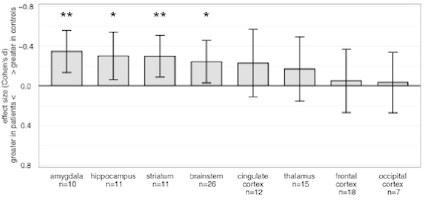No CrossRef data available.
Article contents
EPA-1672 – The Serotonin Transporter in Depression: Meta-analysis and Implications for Understanding and Treating Depression
Published online by Cambridge University Press: 15 April 2020
Abstract
Altered serotonin transporter levels have been reported in blood and brain of patients with major depressive disorders, and drugs that target serotonin transporters are the most commonly used antidepressants in the US. However, the strength and consistency of the evidence for altered serotonin transporter availability in major depressive disorder is not clear. To address this, a systematic literature search was conducted to identify all in-vivo neuroimaging and post-mortem studies studies. Differences in serotonin transporter availability in patients with depression compared with controls were extracted together with potentially moderating variables. Random-effects meta-analysis was conducted for findings in the hippocampus, amygdala, striatum, thalamus, brainstem, and frontal, occipital and cingulate cortices. The final sample consisted of fifty (n=25 in-vivo and n=25 post-mortem) studies including 840 patients with depression (mean age: 43.1 years) and 931 healthy controls (mean age: 43.1 years). Serotonin transporter binding was signficantly reduced in depression in the hippocampus (d=-0.34, p<0.001), the amygdala (d=-0.35, p<0.001), the striatum (d=-0.30, p<0.001) and the brainstem (d=-0.24, p=0.03), including the midbrain (d=-0.25, p=0.02). The results were not significantly influenced by publication bias or a number of potential confounding factors. These findings indicate that serotonin transporter availability is reduced in some brain regions in major depression. This provides direct support for the serotonin hypothesis of depression, and suggests abnormalities may affect specific aspects of the limbic circuit.

- Type
- E05 - e-Poster Oral Session 05: Childhood and Geriatry, Depression
- Information
- Copyright
- Copyright © European Psychiatric Association 2014



Comments
No Comments have been published for this article.